The sheer stupidity of killing the Iran deal
Decertifying the Iran deal could plunge the U.S. into yet another nuclear crisis
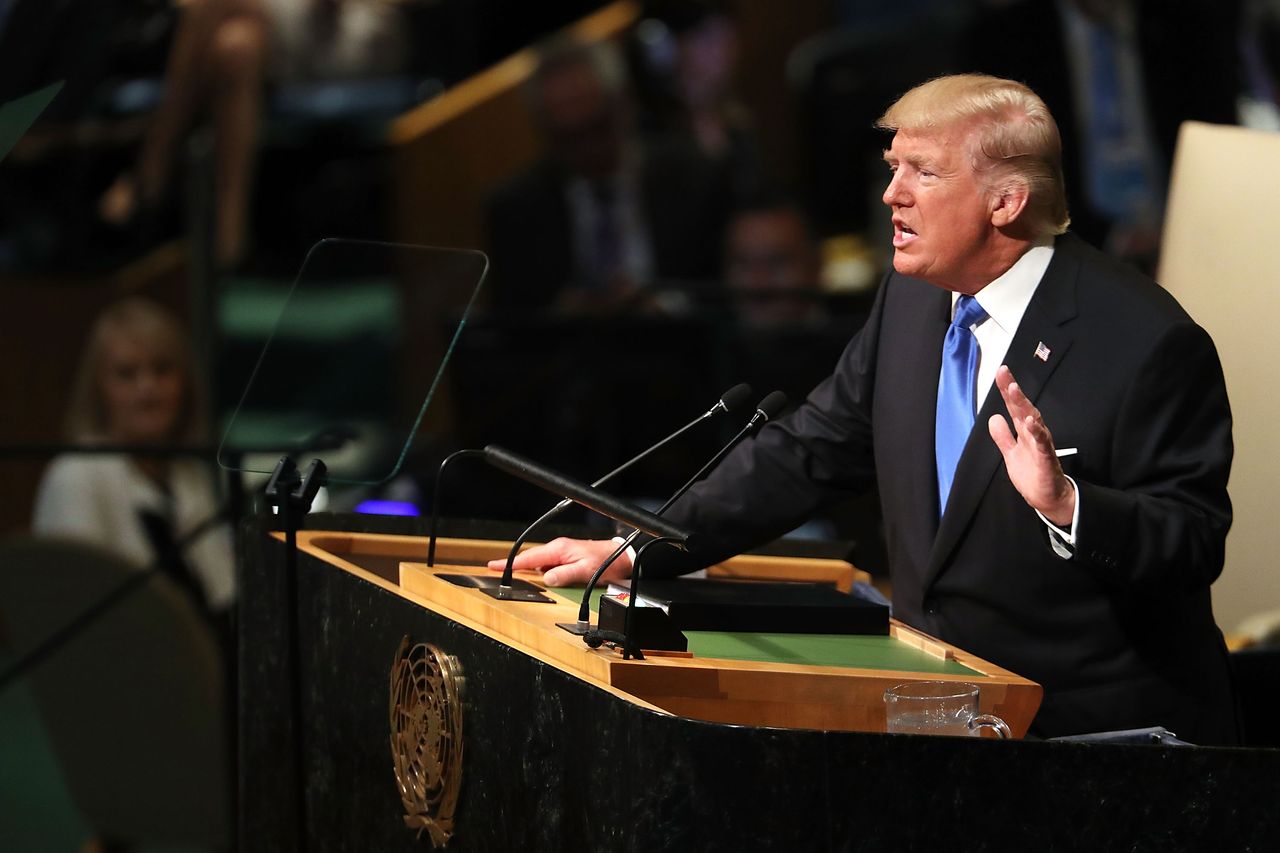

Not content merely to terrify the American people with casual threats of nuclear annihilation via Pyongyang, President Trump and his bumbling gang of off-message middle-managers have reportedly decided to "decertify" Iran's compliance with the Joint Comprehensive Plan of Action (JCPOA), better known as the Iran deal, thereby plunging the United States into a second, simultaneous nuclear crisis.
The president is expected to make the announcement this week, something he has apparently wanted to do throughout his time in office but was talked out of repeatedly by cooler heads. With the nominal Secretary of State Rex Tillerson serving a time-out in the corner of shame for calling the president a "moron," and with the Russia investigation closing in on some of his closest advisers, President Trump has decided that now is the time to force further concessions from Tehran. His advisers believe the Obama administration erred by failing to link sanctions relief to other issues, such as financing for Hezbollah or support for the Assad regime in Syria.
Curiously, President Trump does not intend to immediately impose new sanctions on Iran, something that would instantly blow the deal apart. According to a report in Politico, the plan is "to allow the president to demonstrate contempt for the agreement and broadcast a new level of toughness toward the Iranian regime." In the meantime, presumably, the Iranians would be convinced by the threat of new sanctions from Congress to capitulate by evacuating militias from Syria or cutting ties to Hezbollah (or choosing to cooperate with the dramatic denouement of some other longstanding Iran-related neoconservative fantasy). Lurking behind all of these delusions is the fervent belief in certain corners of the right that the U.S. can topple the Iranian government with the right mixture of coercion and isolation.
Subscribe to The Week
Escape your echo chamber. Get the facts behind the news, plus analysis from multiple perspectives.

Sign up for The Week's Free Newsletters
From our morning news briefing to a weekly Good News Newsletter, get the best of The Week delivered directly to your inbox.
From our morning news briefing to a weekly Good News Newsletter, get the best of The Week delivered directly to your inbox.
Even for a team of capable, meticulously prepared diplomats, this would be an impossible proposition. In the hands of the somnambulant and marginalized Tillerson and the erratic, uninformed president he serves, it is an invitation to mayhem. First, the U.S. lacks meaningful leverage over Iran. The other members of the U.N. Security Council who negotiated the nuclear agreement along with the United States have made it clear that they have no intention of re-entering negotiations with Iran should the U.S. intentionally or unintentionally scuttle the deal.
German Chancellor Angela Merkel, in fact, regards the Iran deal as the model for future negotiations with North Korea. French President Emmanuel Macron called the possibility of walking away from the deal "a grave error." Russian Foreign Minister Sergey Lavrov argued that "It is very important to preserve it [the deal] in its current form." And the British Embassy stated simply that "the Iran nuclear deal is working." China and Iran have warned the president that they have no intention of reopening negotiations.
That leaves America where it has so often been during the last two Republican administrations: isolated on an island of its own making, jumping at voices no one else hears, and determined to burn America's dwindling supply of good will as quickly as possible. The U.S. will find it impossible to convince allies to make economic sacrifices when there is no discernible pretext for destroying or renegotiating the deal, and trying to freshly punish other countries for doing business with Iran will surely end in America's humiliation. Not only are other states likely to call the president's bluff, but they will do so by treating us like a drunk relative at Thanksgiving. "Oh don't mind Uncle America. He lost it a long time ago and he'll be dead soon."
In addition, there is no guarantee that Tehran will perceive the nuance in the Trump administration's position here — something you might call "Skinny Abrogation." In fact, they may very well regard the act of decertification as signaling America's intent to withdraw from the agreement altogether, particularly since Iranian President Hassan Rouhani has staked his legitimacy on the success of the agreement.
Once the president decertifies Iran's compliance, Congress has just 60 days to decide whether to "snap back" nuclear-related sanctions as well as a host of secondary sanctions that were waived by the JCPOA. Is Iran to believe that President Trump will have the wherewithal or the time to gather all the U.N. Security Council powers together in that time, hammer out an agreement, and then obtain the consent of a Republican Congress that remains obstinately opposed to any accommodation with Tehran at all? Who will lead the negotiations? Tillerson helms a State Department that has been gutted but not rehabbed, and no other senior official in the administration is even remotely up to the task.
And if the deal does unravel, what's the plan? Do you trust this foreign policy team to craft a sage policy that achieves American goals without armed conflict?
There's a broader issue at stake here, one that goes well beyond whatever the president decides to do in this one case: the reputation of the United States as a reliable partner in international negotiations. The Iran deal will be the second international agreement that the Trump administration has torpedoed in his first year in office, after withdrawing from the Paris Agreement. The last Republican president, George W. Bush, famously deep-sixed the 1994 Agreed Framework with North Korea in 2002 rather than working with Pyongyang to address violations. North Korea, unsurprisingly, tested its first nuclear device four years later.
After defeating the Comprehensive Test Ban Treaty (CTBT) in a 1996 floor vote, Senate Republicans scuttled, by making it clear that they would reject, the 1997 Kyoto Protocol on climate change and the 2000 Rome Statute establishing the International Criminal Court (ICC). The George W. Bush administration then withdrew from the Anti-Ballistic Missile Treaty in 2002 before sidelining the United Nations and the International Atomic Energy Agency in its ill-fated rush to calamitous war in Iraq. In 2012, Republicans then narrowly killed the Convention on the Rights of Persons With Disabilities (yes you read that correctly) by leaving it six short of the two-thirds majority needed for ratification in the Senate.
The United States can no longer be counted on to be part of global efforts to address problems that cross borders. Why on Earth would any country ever negotiate in good faith with the United States when agreements signed with America can't be counted on to outlast even a single transfer of power and when it is basically impossible to get any treaties at all through the United States Senate?
Despite promising during the campaign to avoid new entanglements in the Middle East, President Trump has always been in thrall to his party's most unhinged unilateralists, and eager to do their bidding. As a result, he is about to lead the United States into possibly the most dangerous and needless crisis of his already interminable presidency.
Sign up for Today's Best Articles in your inbox
A free daily email with the biggest news stories of the day – and the best features from TheWeek.com
David Faris is an associate professor of political science at Roosevelt University and the author of It's Time to Fight Dirty: How Democrats Can Build a Lasting Majority in American Politics. He is a frequent contributor to Informed Comment, and his work has appeared in the Chicago Sun-Times, The Christian Science Monitor, and Indy Week.
-
 Scientists want to fight malaria by poisoning mosquitoes with human blood
Scientists want to fight malaria by poisoning mosquitoes with human bloodUnder the radar Drugging the bugs
By Devika Rao, The Week US Published
-
 Crossword: March 31, 2025
Crossword: March 31, 2025The Week's daily crossword
By The Week Staff Published
-
 Sudoku medium: March 31, 2025
Sudoku medium: March 31, 2025The Week's daily medium sudoku puzzle
By The Week Staff Published
-
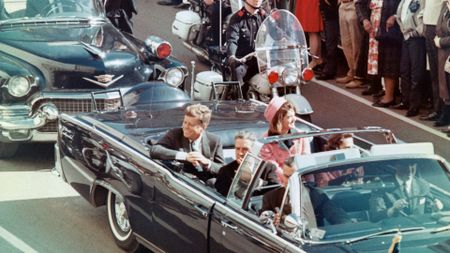 The JFK files: the truth at last?
The JFK files: the truth at last?In The Spotlight More than 64,000 previously classified documents relating the 1963 assassination of John F. Kennedy have been released by the Trump administration
By The Week Staff Published
-
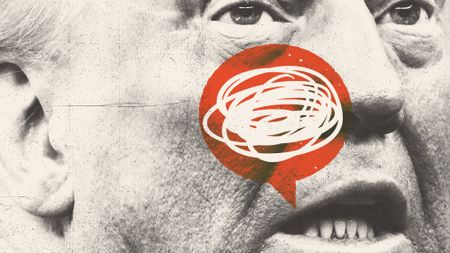 'Seriously, not literally': how should the world take Donald Trump?
'Seriously, not literally': how should the world take Donald Trump?Today's big question White House rhetoric and reality look likely to become increasingly blurred
By Sorcha Bradley, The Week UK Published
-
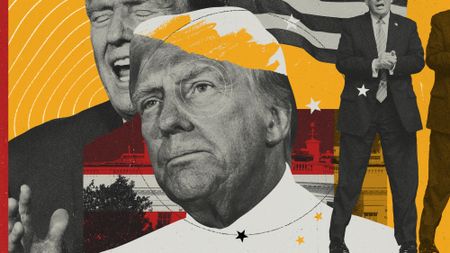 Will Trump's 'madman' strategy pay off?
Will Trump's 'madman' strategy pay off?Today's Big Question Incoming US president likes to seem unpredictable but, this time round, world leaders could be wise to his playbook
By Sorcha Bradley, The Week UK Published
-
 Democrats vs. Republicans: who are the billionaires backing?
Democrats vs. Republicans: who are the billionaires backing?The Explainer Younger tech titans join 'boys' club throwing money and support' behind President Trump, while older plutocrats quietly rebuke new administration
By Harriet Marsden, The Week UK Published
-
 US election: where things stand with one week to go
US election: where things stand with one week to goThe Explainer Harris' lead in the polls has been narrowing in Trump's favour, but her campaign remains 'cautiously optimistic'
By Harriet Marsden, The Week UK Published
-
 Is Trump okay?
Is Trump okay?Today's Big Question Former president's mental fitness and alleged cognitive decline firmly back in the spotlight after 'bizarre' town hall event
By Harriet Marsden, The Week UK Published
-
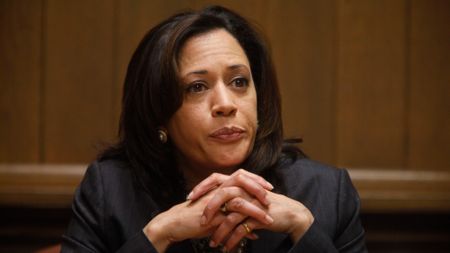 The life and times of Kamala Harris
The life and times of Kamala HarrisThe Explainer The vice-president is narrowly leading the race to become the next US president. How did she get to where she is now?
By The Week UK Published
-
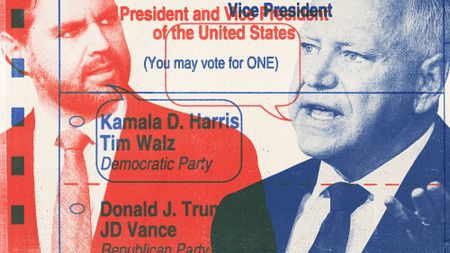 Will 'weirdly civil' VP debate move dial in US election?
Will 'weirdly civil' VP debate move dial in US election?Today's Big Question 'Diametrically opposed' candidates showed 'a lot of commonality' on some issues, but offered competing visions for America's future and democracy
By Harriet Marsden, The Week UK Published
